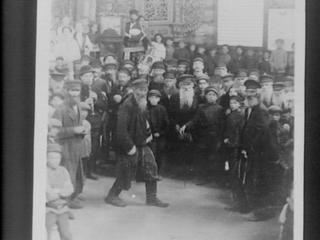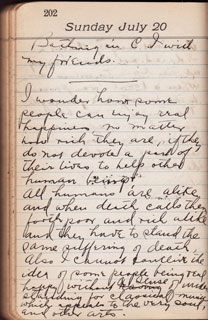
Baseball game in afternoon
Radio at night
I am anxiously waiting for
next Monday when I will
resume work after a forced
vacation of 3 weeks, besides
being terrible doing nothing
I am also broke and I am
heavily indebted. My reso-
lution to save (from the 1st of
January) was so far a dream
Unexpected misfortunes
befell me simultaneously
and unexpectedly which
upset my earlier plans however
I’m hopeful for better times,
—————
Matt’s Notes
The Giants and Robins (a.k.a. Dodgers) were both on the road this day, so Papa must have seen the Yankees-Indians double-header at the Stadium. The Yankees split, losing 9-2 in the first game and winning 7-2 in the second, keeping the Yankees in a tight race for first with the Senators and surging Tigers.
 The highlight of the day was an inside-the-park home run by Yankees slugger Bob Meusel (Babe Ruth must have walked a lot since he only recorded 5 at bats for both games) though for me, once again, the most impressive details in the box scores are the game times — both games clocked out at 2:05, meaning the Yankees banged out a double header in the time it takes modern-day American league teams to play a single prime-time game.
The highlight of the day was an inside-the-park home run by Yankees slugger Bob Meusel (Babe Ruth must have walked a lot since he only recorded 5 at bats for both games) though for me, once again, the most impressive details in the box scores are the game times — both games clocked out at 2:05, meaning the Yankees banged out a double header in the time it takes modern-day American league teams to play a single prime-time game.
Papa might have even moved down to a better seat than he could usually afford since there were only 20,000 on hand at the Stadium, but it looks like he had weightier matters on his mind. He has felt especially pessimistic while he’s been out of work, and, as is often the case when one is low on money and self-esteem, even the prospect of working and earning again does little more than remind him of his debts and trigger reflections on the year’s difficult developments.
The “unexpected misfortune” most on his his mind is, of course, the relatively recent death of his father. This also led to his “heavily indebted” state since he had to take out a $100 loan to help his family in the old country with funeral and living expenses. Papa is sad enough to berate himself for not keeping his New Year’s resolution to save more money even though he said at the time he didn’t really believe in resolutions, and I’m sure he’s also running through a checklist of the year’s romantic disappointments and bouts of homesickness.
Sometimes when I read Papa’s words I feel, irrationally, like he’s deliberately written something just for me, and the last line of this entry, in which he says he’s “hopeful for better times,” seems like it’s there just to make me feel less sad for him as I write this on a dark, rainy morning. Better times did arrive for him, as we know, though I have no way to go back and say to him Papa, this is you:

———-
References:
YANKS BREAK EVEN AS PENNOCK WINS; Southpaw Takes Sixth in Row, Beating Indians in Second, 7-2 — Champions Lose Opener, 9-2. (From the July 19, 1924 New York Times.)
Image source: “Robert William Meusel, New York Yankees outfielder” taken in the 1920s. Library of Congress #LC-USZ62-127876. No known restrictions on publication.

 His fellow congregants probably danced in the halls of the schul and poured out onto East Broadway, singing Hebrew songs and crowding together as they did on
His fellow congregants probably danced in the halls of the schul and poured out onto East Broadway, singing Hebrew songs and crowding together as they did on  Bathing in C.I. with
Bathing in C.I. with


